
Creating the Ultimate Hybrid Gaming Setup: Merging Smartphone, Augmented Reality Glasses & Cloud Technology

Creating the Ultimate Hybrid Gaming Setup: Merging Smartphone, Augmented Reality Glasses & Cloud Technology
Highlights
- Mobile gaming, AR glasses, and cloud gaming provide flexibility and a unique gaming experience.
- Utilizing Samsung devices, XReal Air 2 AR Glasses, and a Bluetooth controller enhances gaming.
- Streaming games with NVIDIA GeForceNOW provides access to a broad range of titles on the go, offering a magical immersive experience.
I like to play games. I just don’t play them the way most people do. I don’t have a console, a TV, or a gaming handheld. I play real “gamer” games, sure, but I do so on my phone. Lately, I use AR glasses, too, and I think it’s the best gaming experience I’ve ever had.
Why I Don’t Have a Gaming PC
I’ve never been particularly drawn to the idea of either building or buying a gaming PC. To me, a keyboard and mouse feel better suited for work than for fun. Plus, as someone who has spent his entire adult life in a committed relationship, I haven’t wanted to confine myself to a desk when it’s time to unwind.
I grew up a console gamer, though I haven’t had one in around a decade. I owned a Steam Deck for a while, and it was the closest thing yet to being what I would consider my ideal dedicated gaming machine. But I sold it anyway. I found it too big and unwieldy for my lifestyle.
I’ve ultimately discovered that I really enjoy Android gaming. The selection is vast, ranging from casual-but-gorgeous mobile experience to console ports that play better with a controller. Importantly, my phone offers the most flexibility about when and where I can play.
I can game in the car while I wait to pick up my kids without having to first remember to grab a bulky carrying case. I can play something chill while my wife and I are curled up with each other and our screens. I can drop my phone on a dock and use a Bluetooth controller. I can connect to an external display when I can go for a more immersive experience. And I can go all in with AR glasses, combined with cloud gaming, to create a shockingly good hybrid setup.
Here’s The Hardware I Use Instead
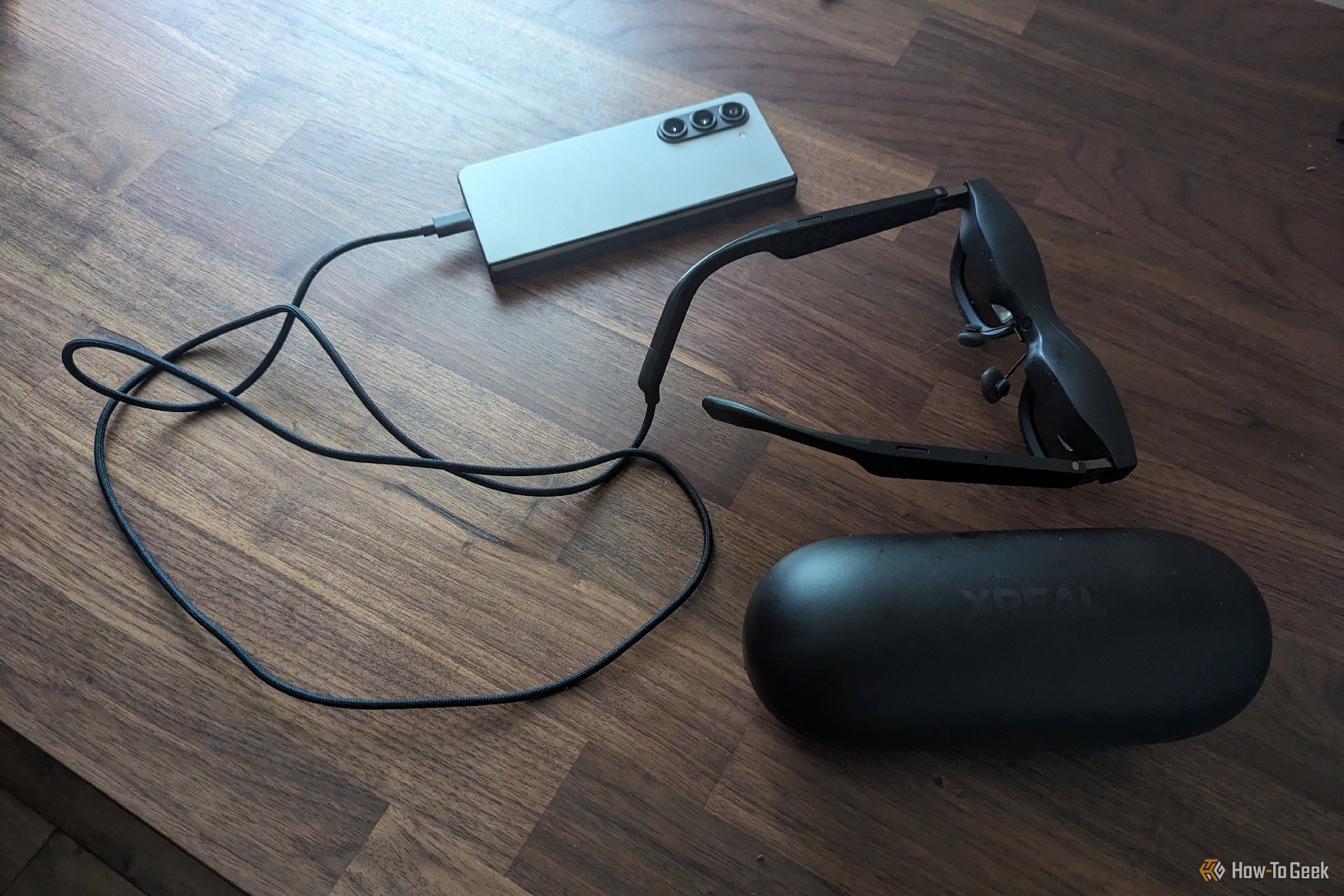
Bertel King/ How-To Geek
These are the specific devices I’ve purchased to make my hybrid gaming setup work.
Samsung Galaxy Z Fold 5
My current phone is the Galaxy Z Fold 5 . My previous one was the Motorola Edge+ 2023. Both offer desktop modes and, by extension, have the ability to display video on an external display when you connect via a USB-C cable. The Galaxy Z Fold 5 has a large screen for tablet-style gaming while also supporting compatibility with lapdocks , external monitors, and AR glasses—no additional setup or software required.
For the time being, this setup is easiest with Samsung devices, since most of the premium models support Samsung DeX and video out (the Galaxy Z Flip 5 is a notable exception, due to the smaller form factor overheating under that much load). High-end Motorola phones are the second-best bet. The iPhone 15 and Pixel 8 are compatible, but older models aren’t.
XReal Air 2 Pro AR Glasses

Bertel King / How-To Geek
I haven’t used many AR glasses, so I can only go off reviews like almost everyone else. Many reviewers have called XReal’s glasses the best in their class, so I figured I’d most likely have a good experience by going with these (though our own XReal Air 2 review is a bit more reserved). XReal also explicitly lists my phone as a supported model, not that I had much concern even if it didn’t. The Z Fold 5 can cast video to anything I’ve thrown at it.
The most important bit was that the glasses function out of the box as a basic external display with no app required, though there is an app with added features for those who want to take things further.
8BitDo Pro 2 Bluetooth Controller
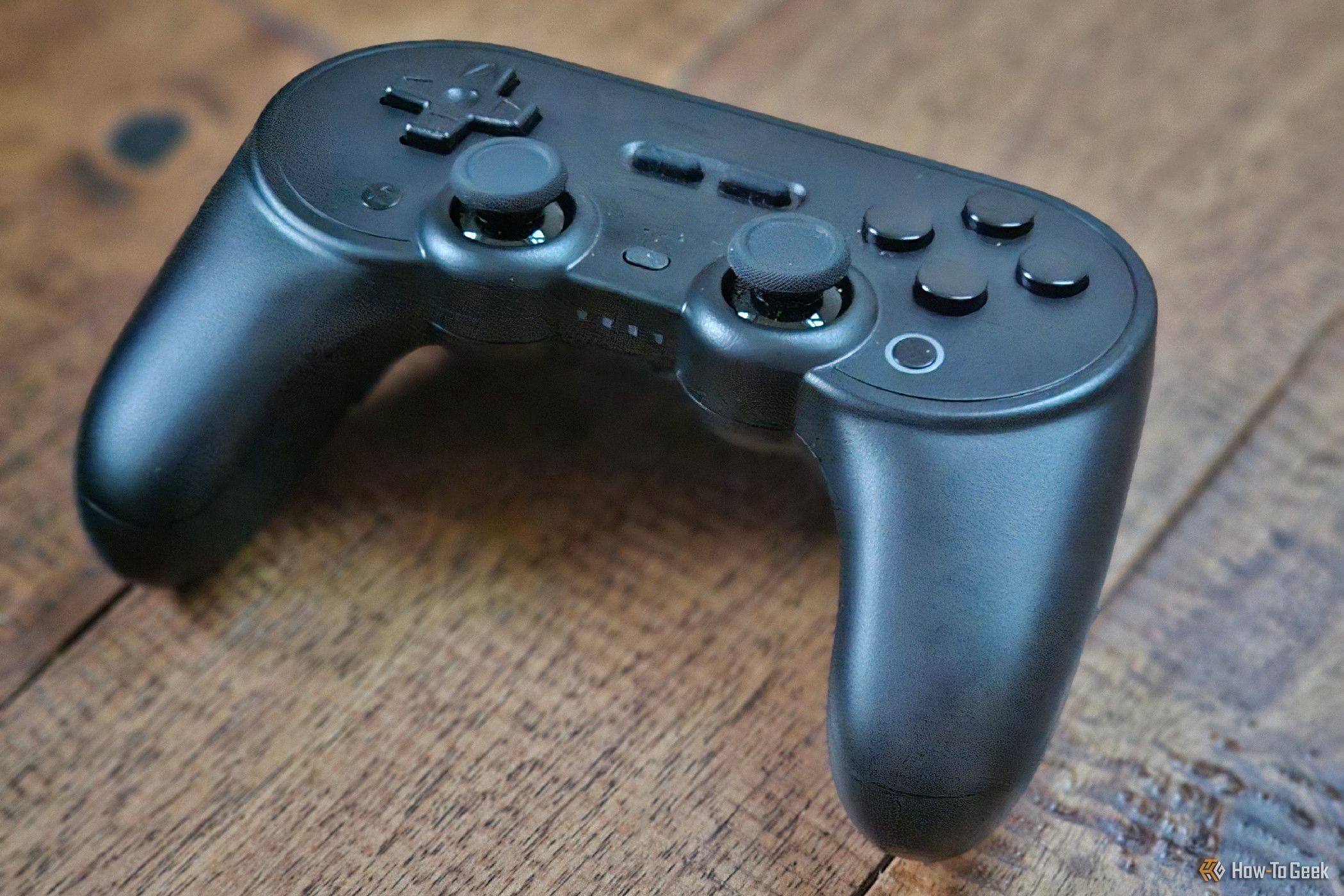
Bertel King / How-To Geek
The 8BitDo Pro 2 is my favorite Bluetooth controller. It’s comfortable to hold, works great with both D-Pad and joystick-based games, looks elegant, and feels like it could survive being chucked out a window (note: at my house it would land on grass, not concrete).
Just about any Bluetooth controller is up for the task, so go with what works for you.
Logitech Pebble Mouse
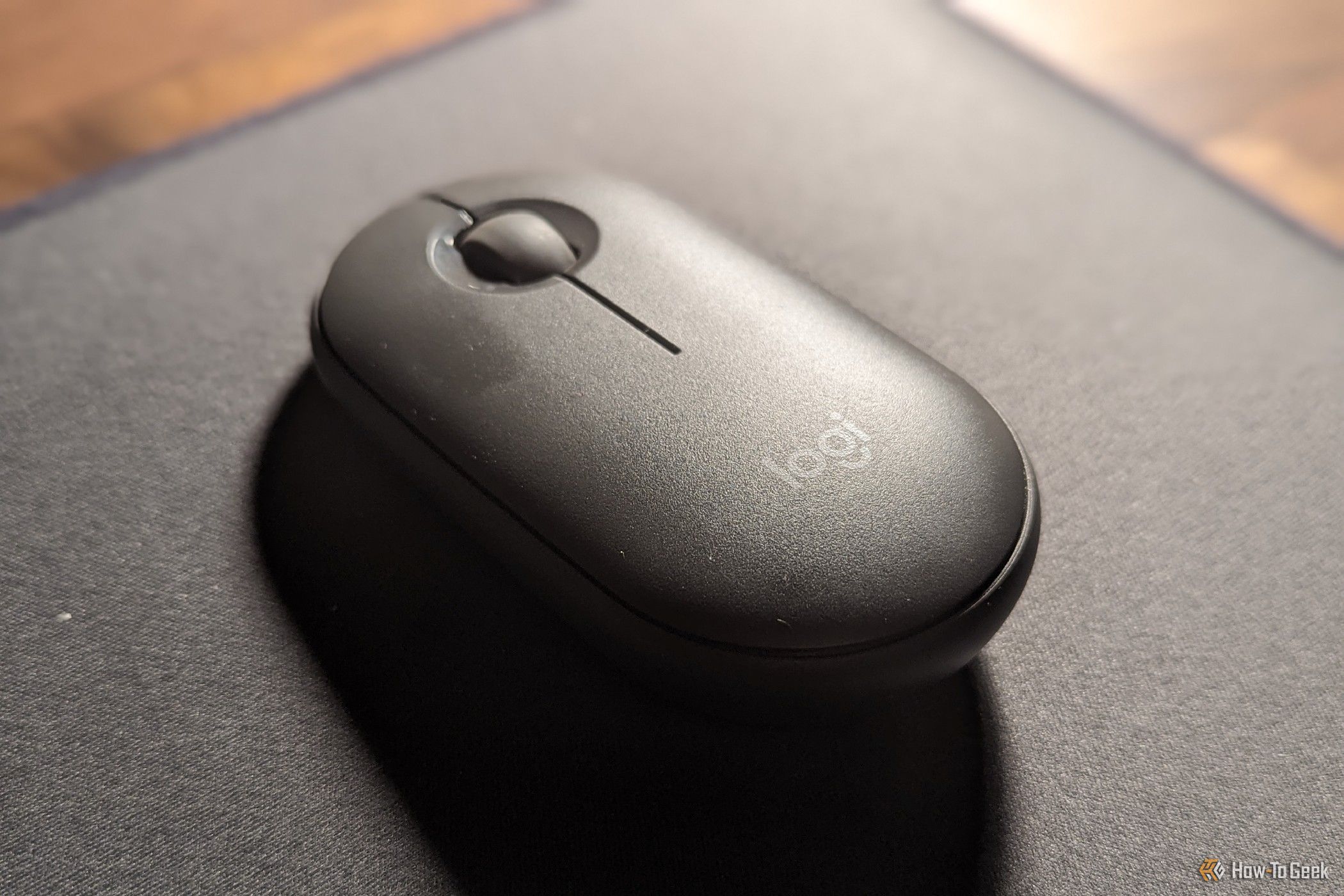
Bertel King/ How-To Geek
When you’re connected to an external display, a cursor mimics touch input. That means you can play most Android games with AR glasses on, as long as the game doesn’t require multitouch. Gestures like pinch-to-zoom can’t be replicated with a mouse.
I Play Both Mobile and PC Games
I primarily play mobile games. These are the games that are easiest to launch regardless of my internet connection and what peripherals I have with me. I either purchase games outright, get them as part of a Play Pass subscription, or enjoy the games that come with Netflix. It’s difficult sifting through all the subpar cash grabs in the Play Store, but there are still many excellent options to choose from, enough to be considered a respectable library on a game console.
NVIDIA GeForceNOW is my go-to cloud gaming option, since it provides access to much of my Steam library. It allows me to continue playing games I previously played on my Steam Deck and to purchase new PC releases as though I owned a gaming PC.
Your experience with cloud gaming will depend on your connection speeds and any number of other factors, so I won’t dwell on that. Streaming so far has worked for me. I’ve played several hours of Sea of Stars, though that isn’t particularly demanding. Don’t Nod’s Twin Mirror, though released in 2020, is more demanding. It doesn’t matter. More often than not, I don’t experience any buffering in either one, though neither is the kind of game where the risk of an occasional stutter would keep me up at night.
Not every game I want to play is available through NVIDIA’s service, but enough of them are that I don’t feel like I’m missing out. There’s also Xbox Game Pass if I feel like I need to expand the number if games available to me even further.
What the Experience Is Like
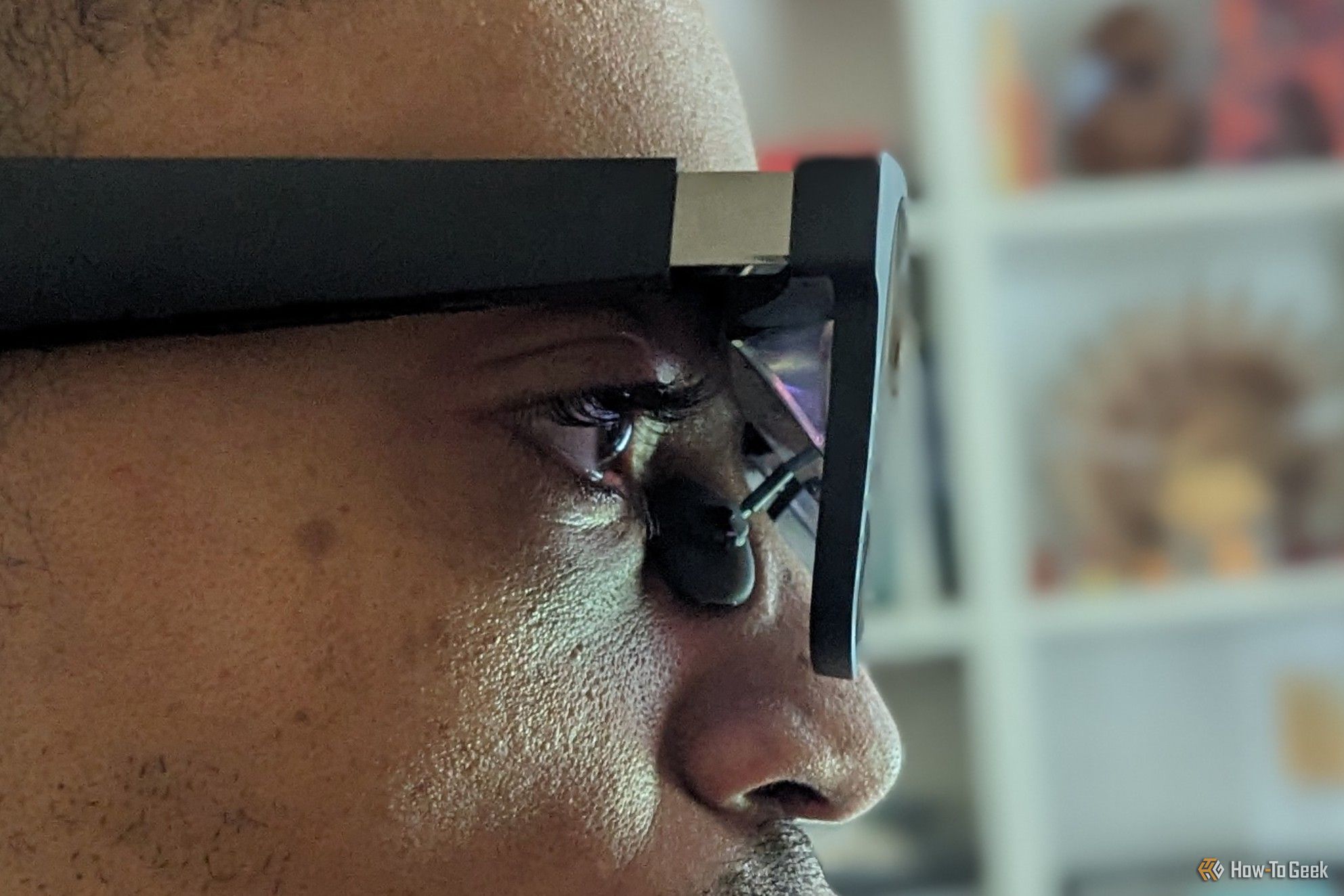
Bertel King / How-To Geek
Many mobile games are more enjoyable with AR glasses. Iron Marines, for example, doesn’t scale well to the Z Fold 5’s non-standard screen sizes on both the cover and main displays. It feels right at home with AR glasses, which output at 1920 x 1080. The same can be said for point-and-click adventure games, like Machinarium. Monument Valley is a masterclass in making a game adaptive. It scales well and feels just as playable regardless of whether it’s on the cover display, the interior screen, or through the glasses.
With cloud gaming, I have given little thought to the reality that the games are being streamed. Once launched, the games feel native. I rarely experience lag or buffering. Even though most of the connections are wireless, I don’t experience a noticeable delay between the controller and the phone, the phone and the glasses, or the phone and the internet.
It feels a bit magical, really. I can relax in bed under a blanket, mashing away at a Bluetooth controller, staring up at a virtual display that feels like it’s covering most of the ceiling. It’s like gaming on a projector rather than a TV. Everything is huge, yet the experience comes in a package that I can easily pack up and take with me.
The immersion doesn’t quite compare to VR. Unlike goggles, glasses do not block out light from around your eyes. You can always see the rest of the world around you. You can tint the glasses pitch black, but light will still come in from around the sides. That’s why using the glasses feels more like a home theater experience than a virtual one. You still need to dim the lights if you want the deepest immersion.
The biggest downside to the experience has been managing battery life. The glasses draw power from the device they’re connected to. If you want to charge your phone without unplugging your glasses, you need to buy a special dock from XReal, use a supported alternative, or try your luck with a wireless charger. None of the docks or USB-C hubs I own have worked. My wireless charging pad provides enough juice to either break even or reduce the rate of discharge, which helps, but the phone gets pretty toasty in the process.
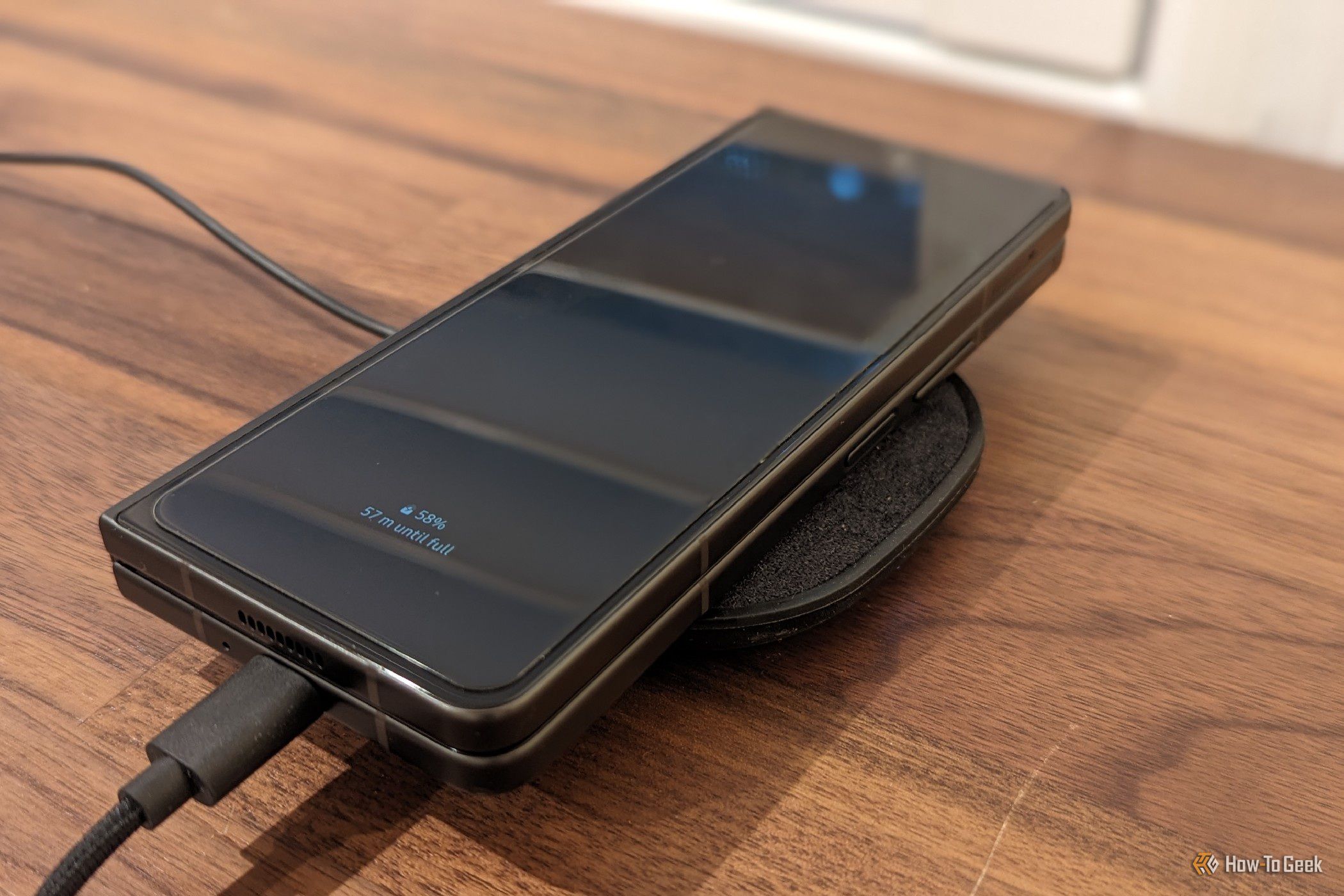
Bertel King/ How-To Geek
In spite of the charging issues, the experience has been good enough that I’ve used these same AR glasses to replace my computer monitor for work .
As unconventional as it may be, I can highly recommend gaming on AR glasses connected to a phone. I get to game on a display at a screen size I could previously only have dreamed of, and I get to do so wherever I want. Internet speeds are a limitation when trying to play PC games, but native mobile games are accessible wherever and whenever.
What I’ve enjoyed more than the games themselves, though, is a feeling that I haven’t felt in a long time—that technology still has the capacity to genuinely wow me.
Also read:
- [New] Expertise in Making Screen Captures on iOS Easier for 2024
- [Updated] 2024 Approved How to Add Motion Blur to Photos In Adobe Illustrator
- [Updated] In 2024, How to Host a Webinar on YouTube for Free
- Analyzing the Samsung CF591: A Potent Choice for Gamers Today
- Assessing the Cost-Effective Apple Watch SE
- Discover the Capabilities of Dreame Bot L1 0 Pro - The Ultimate Mopping & Vacuuming Automaton with Precision LiDAR Guidance
- Looking For A Location Changer On Samsung Galaxy A25 5G? Look No Further | Dr.fone
- Streamline Your Sound Recording on Windows 11
- Taking It Up a Notch: Exploring the Enhanced Connectivity, Controls & Insights in the New Samsung Galaxy Watch Active ˈtvo
- The Evolution of Watch Dogs Series: A Comprehensive Review of 'Legion'
- Top 6 Criteria: Integrating ChatGPT Into Psychological Care Routines
- Title: Creating the Ultimate Hybrid Gaming Setup: Merging Smartphone, Augmented Reality Glasses & Cloud Technology
- Author: Eric
- Created at : 2024-11-17 22:52:48
- Updated at : 2024-11-24 16:30:49
- Link: https://buynow-reviews.techidaily.com/creating-the-ultimate-hybrid-gaming-setup-merging-smartphone-augmented-reality-glasses-and-cloud-technology/
- License: This work is licensed under CC BY-NC-SA 4.0.